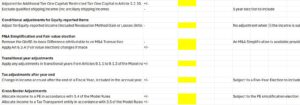
Italy Approves Model for the GloBE Tax Return
On February 6, 2026, the Italian Revenue Agency approved the model for the GloBE tax Return. This is a consolidated form with information on the calculation of top-up tax under the IIR, UTPR and QDMTT.
Contents
General
On March 20, 2023, the German Federal Ministry of Finance published a consultation, including a draft law (the Minimum Taxation Directive Implementation Act), to implement the EU Global Minimum Tax Directive. The consultation is open for comments until April 21, 2023.
The draft legislation is very comprehensive and, as expected, covers all relevant aspects of the EU Global Minimum Tax Directive.
In particular, it provides for an Income Inclusion Rule (IIR) for financial years beginning after December 30, 2023 and the Under-Taxed Payments Rule (UTPR) for financial years beginning after December 30, 2024.
The draft legislation also includes a Qualifying Domestic Minimum Top-Up Tax (for financial years beginning after December 30, 2023) which reflects the latest design guidance in the OECD Administrative Guidance.
In addition, safe harbours, as reflected in the OECD Safe Harbour Guidance are also reflected in the draft legislation.
The structure of the legislation is:
Part 1: General Provisions/Definitions
Part 2: IIR/UTPR
Part 3: Determination of GloBE Income or Loss
Part 4: Determination of adjusted taxes
Part 5: Determination of the effective tax rate and the top-up tax
Part 6: Business restructuring and shareholding structures
Part 7: Special features of ultimate parent companies, distribution regimes and investment units
Part 8: Administration
Part 9: Special provisions for the transitional year, the transitional period and the initial phase
Part 10: Qualified domestic minimum top-up tax (QDMTT)
Part 11: Procedures and Penalties
This layout is pretty much identical to the EU Minimum Tax Directive, with the addition of two new chapters for the QDMTT and procedures and penalties.
Application
If you haven’t got a subscription you can sign up below

On February 6, 2026, the Italian Revenue Agency approved the model for the GloBE tax Return. This is a consolidated form with information on the calculation of top-up tax under the IIR, UTPR and QDMTT.

Assess Transitional CbCR Safe Harbour eligibility by Tested Jurisdiction using CbCR + financial statement inputs (including key OECD administrative guidance adjustments).

On January 29, 2026, Canada’s Department of Finance released draft GMTA technical amendments introducing an elective private investment entity de-consolidation rule for Pillar Two/GMTA purposes.

On January 30, 2026, Japan’s National Tax Agency issued a law implementation circular clarifying certain aspects of its UTPR and QDMTT.

In January 2026, Canada issued the filing procedures for the GIR, GMT Return and the Double Filing Relief Notification.

On January 19, 2026, South Korea issued a Draft Law to amend the Enforcement Decree to the International Tax Adjustment Act. This provides for detailed provisions for the application of the QDMTT and will also extend the Transitional CbCR Safe Harbour by 1 year (as provided in the January 2026 OECD Side-by-Side Package).

On January 19, 2026, the Hong Kong Inland Revenue Department opened its E-filing portal for the submission of Top-Up Tax Notifications

On December 31, 2025, Israel enacted Law No. Law 5776-2025 on the Minimum Corporate Tax for Multinational Groups. The enacted law contains some significant changes from the previous draft law.

On December 29, 2025, Uruguay’s President issued Decree No. 325/025, to provide for exemptions from the QDMTT for entities covered by a tax stability agreement. Note that Law N° 20446 to enact the QDMTT was published in the Official Gazette on January 8, 2026.

On December 23, 2025, Korea enacted Law number 21215 to implement the 2026 Tax Reform. This includes a QDMTT from January 1, 2026.

On January 5, 2026, the OECD Released Guidance on amendments to the Pillar 2 rules for the Side-by-Side Tax Package. This includes a new Simplified ETR Safe Harbour from December 31, 2026 (December 31, 2025 in certain cases). We provide an excel overview for the key elements of the Safe Harbour calculation.

On January 5, 2026, the OECD Released Guidance on amendments to the Pillar 2 rules for the Side-by-Side Tax Package. This includes a new Substance-based Tax Incentive Safe Harbour. This online tool shows how the new safe harbour operates.
| Cookie | Duration | Description |
|---|---|---|
| cookielawinfo-checkbox-analytics | 11 months | This cookie is set by GDPR Cookie Consent plugin. The cookie is used to store the user consent for the cookies in the category "Analytics". |
| cookielawinfo-checkbox-functional | 11 months | The cookie is set by GDPR cookie consent to record the user consent for the cookies in the category "Functional". |
| cookielawinfo-checkbox-necessary | 11 months | This cookie is set by GDPR Cookie Consent plugin. The cookies is used to store the user consent for the cookies in the category "Necessary". |
| cookielawinfo-checkbox-others | 11 months | This cookie is set by GDPR Cookie Consent plugin. The cookie is used to store the user consent for the cookies in the category "Other. |
| cookielawinfo-checkbox-performance | 11 months | This cookie is set by GDPR Cookie Consent plugin. The cookie is used to store the user consent for the cookies in the category "Performance". |
| viewed_cookie_policy | 11 months | The cookie is set by the GDPR Cookie Consent plugin and is used to store whether or not user has consented to the use of cookies. It does not store any personal data. |